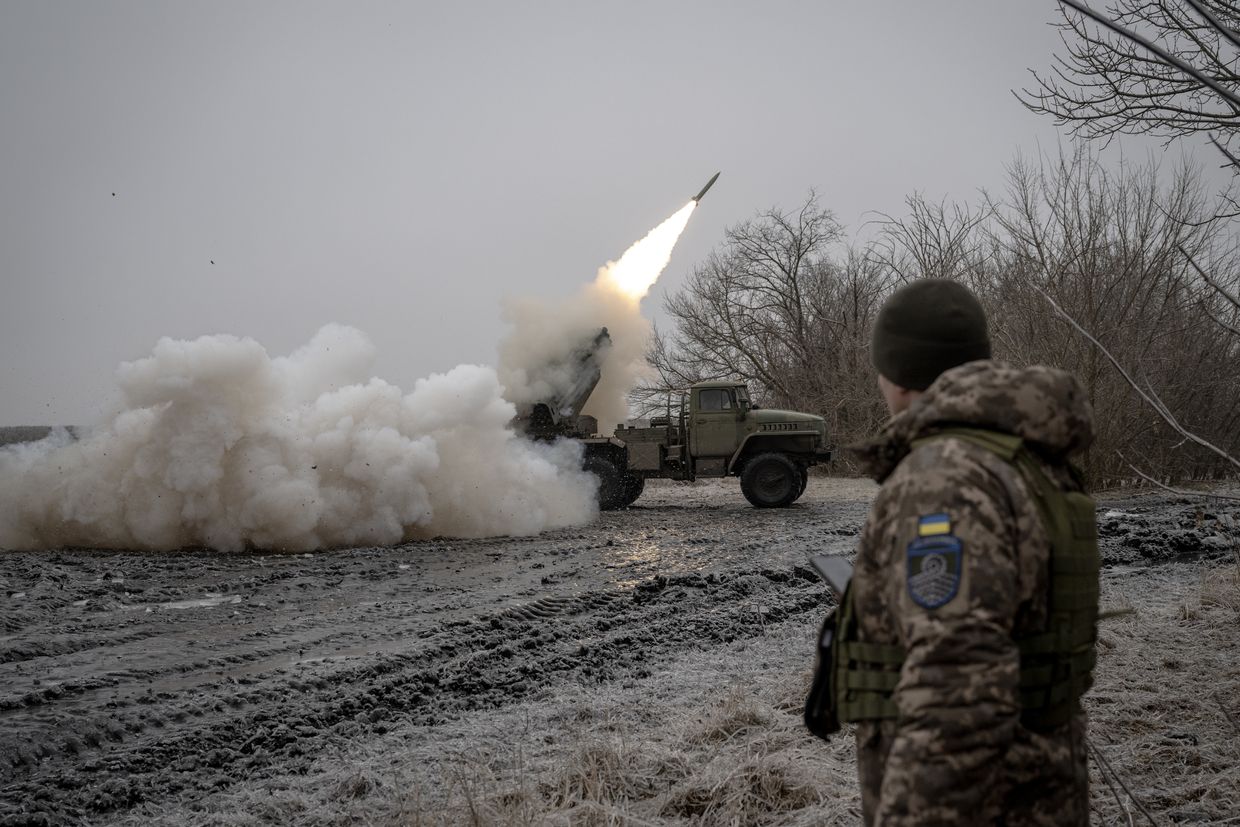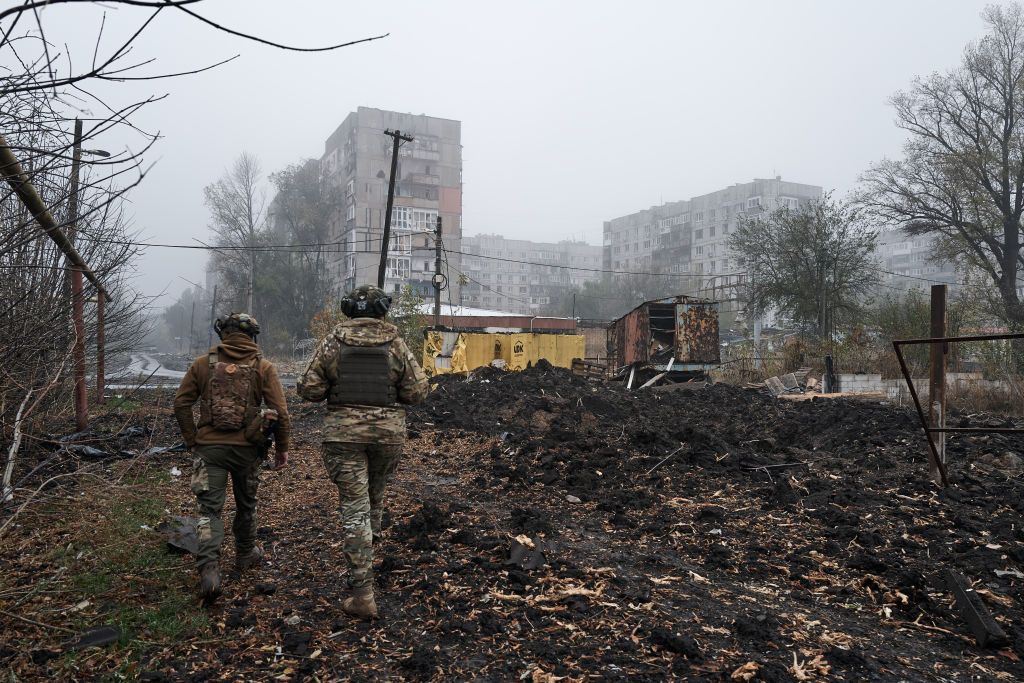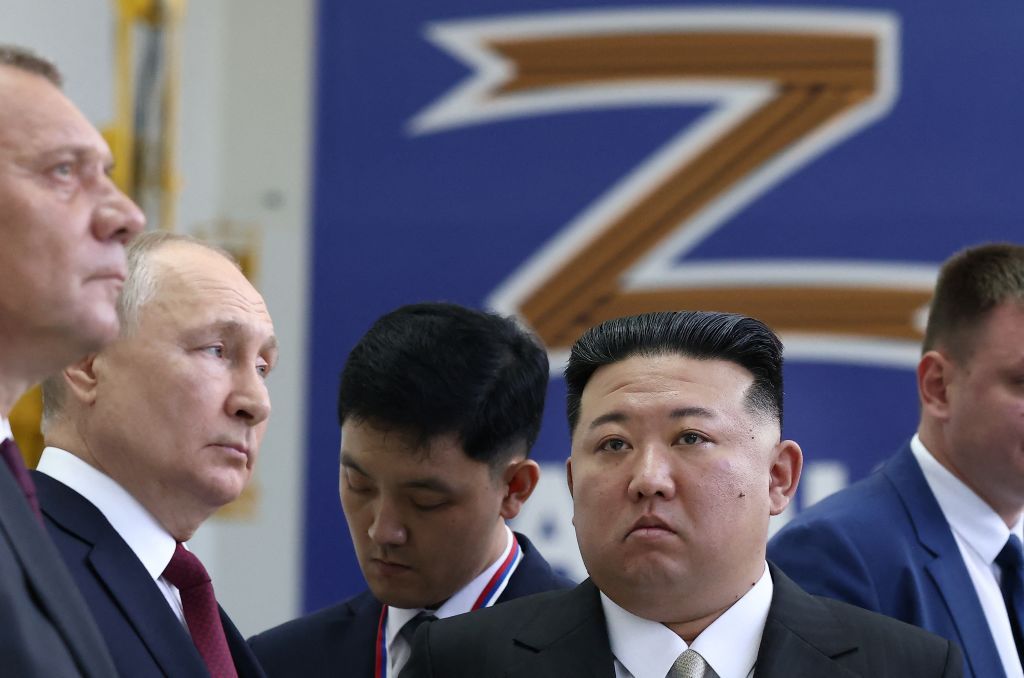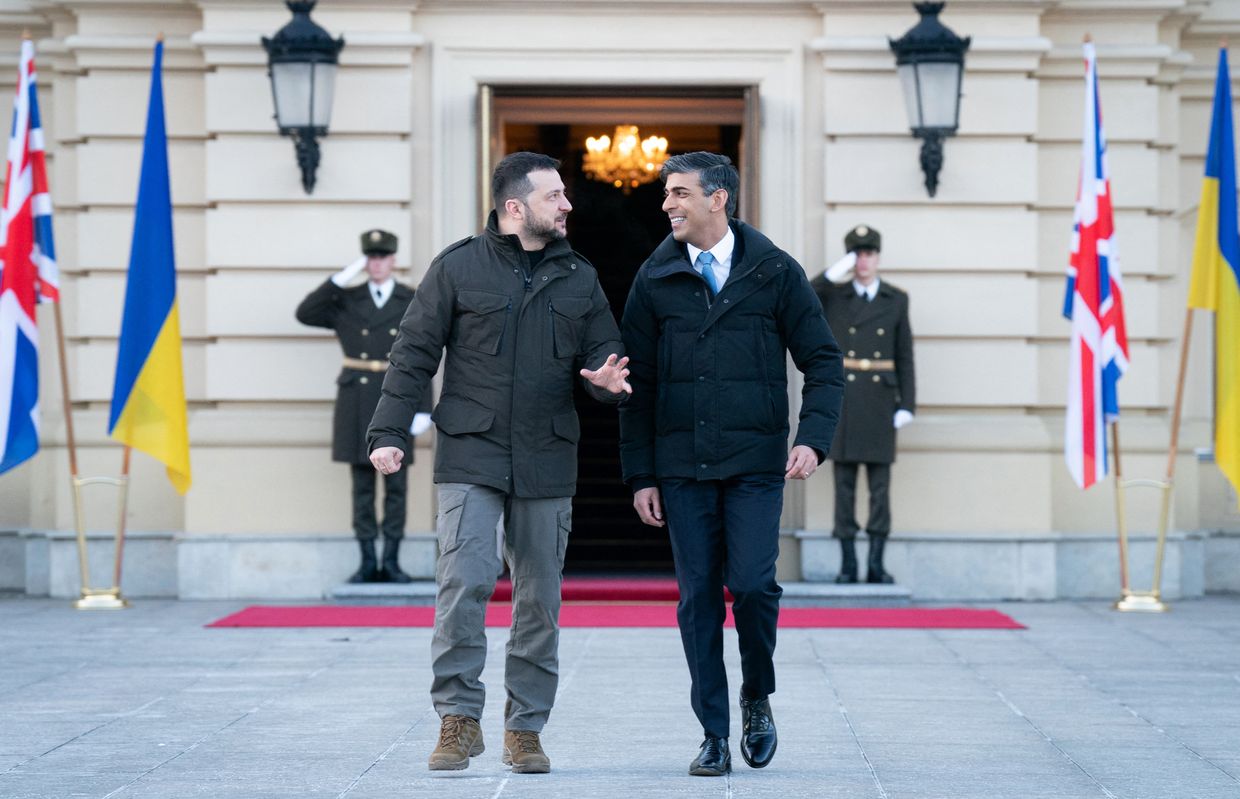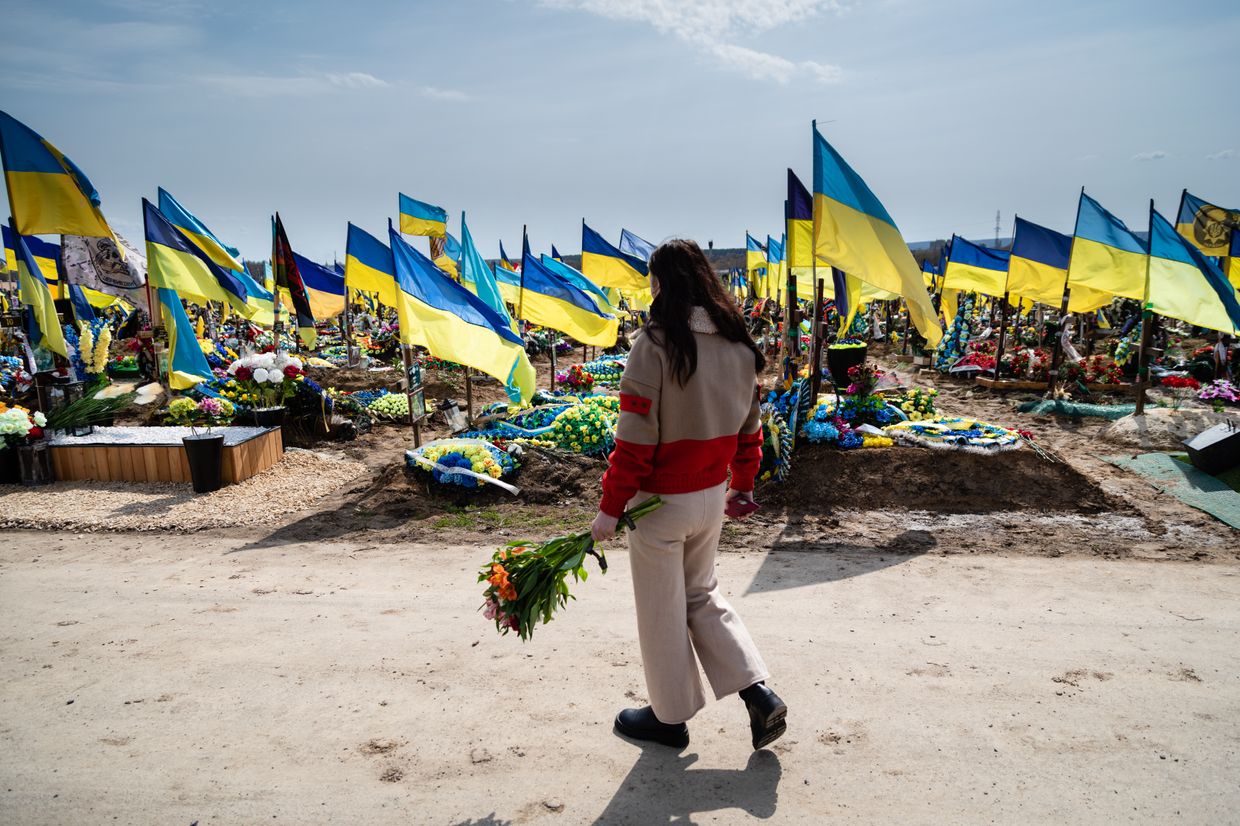Ukraine war latest: Ukrainian forces withdraw from strongpoint on Avdiivka outskirts

Key developments on Feb. 16:
- Commander says no Ukrainian units surrounded in Avdiivka, troops withdraw from strongpoint on city's outskirts
- 3rd Assault Brigade says it wiped out 2 Russian brigades at Avdiivka
- Prosecutor General: Russia has used 24 North Korean missiles in Ukraine
- Germany signs long-term security deal with Ukraine, unveils new aid package
- Ukraine retrieves bodies of 58 fallen soldiers
Commander says no Ukrainian units surrounded in Avdiivka, troops withdraw from strongpoint on city's outskirts
There are no Ukrainian units surrounded in Avdiivka as of 1 p.m. local time, General Oleksandr Tarnavskyi said on Feb. 16, stressing that soldiers' lives are a priority.
Avdiivka, a front-line city mere kilometers from occupied Donetsk, has faced intensified Russian attacks since October 2023 as Moscow's troops aim to encircle and capture the city.
Recent reports suggest that the situation in the sector is growing increasingly dire as Russian forces push into the city.
President Volodymyr Zelensky addressed the situation in Avdiivka during his joint press conference with German Chancellor Olaf Scholz in Berlin.
"I understand in detail what is happening there. I'm in contact with our military leadership," Zelensky said.
"I will not say what new approaches they use. Their primary task is to do everything they can to protect our people."
Tarnavskyi said earlier in the day that the "situation in Avdiivka is difficult, but controlled. Fierce fighting is taking place within the city."
The commander also said that units in the most heavily attacked areas were being reinforced with additional troops. Ukraine's Third Assault Brigade confirmed on Feb. 15 that it was "urgently" redeployed to Avdiivka as the situation grows "extremely critical."
Tarnavskyi also announced earlier on Feb. 16 that Ukrainian forces withdrew from the Zenit strongpoint southeast of Avdiivka as the situation in the front-line city grows increasingly difficult.
Originally built as an air defense complex in the Soviet times, Zenit has been used as an important defensive position by Ukrainian troops since the start of Russian aggression in 2014. It helped the defenders prevent any advances toward Avdiivka directly from the south.
3rd Assault Brigade says it wiped out 2 Russian brigades at Avdiivka
Ukraine's Third Assault Brigade, whose soldiers were recently deployed to Avdiivka, is facing around 15,000 Russian troops at its sector of the front, the unit said on social media on Feb. 16.
During the engagements, the brigade has effectively "wiped out" Russia's 74th and 114th separate motorized rifle brigades. Russia's estimated losses are 4,200 troops killed or wounded, according to the unit's report.
Ukraine's Third Assault Brigade confirmed on Feb. 15 that it was "urgently" redeployed to Avdiivka as the situation grows "extremely critical."
According to the Third Assault Brigade's report, Russia's 30th Separate Motorized Rifle Brigade is also suffering heavy losses. There are ongoing battles against the 35th and the 55th infantry brigades of Russia's 41st Army and against the 21st and 15th infantry brigades of Russia's Second Army.
Even though Russian forces suffered excessive losses, the situation remains "extremely difficult," the Ukrainian brigade said.
Prosecutor General: Russia has used 24 North Korean missiles in Ukraine
Russia has launched at least 24 North Korean missiles against Ukraine, Prosecutor General Andrii Kostin said, Interfax-Ukraine reported on Feb. 16.
Since last autumn, North Korea has reportedly provided Russia with extensive weapons supplies, including artillery shells and ballistic missiles. Western and Ukrainian officials have confirmed their use in Ukraine.
"Currently, at least 24 ballistic missiles that were most likely produced in North Korea were used during Russian missile attacks on the territory of Ukraine" between Dec. 30, 2023, and Feb. 7, Kostin told journalists in Kyiv.
Russian forces reportedly carried out 12 attacks against seven Ukrainian oblasts with these weapons. Some 14 civilians were killed in these strikes, and 70 more were injured, Kostin said.
The most extensive use of this weaponry was recorded on Feb. 7, when Kyiv was attacked with one North Korean missile, while Pavlohrad and Kharkiv were struck by two missiles each, according to the official.
The missiles' origin was confirmed in an analysis by a joint working group of the Prosecutor General's Office and the Defense Ministry, Kostin said.
Based on these findings, the missiles contain high-explosive warheads with a capacity equivalent to 500-1,000 kilograms of TNT and have a maximum range of 650 kilometers.
The U.S. and nearly 50 countries condemned the transfer and use of North Korean missiles by Russia, calling for an immediate end to the delivery of weapons from Pyongyang to Moscow.
South Korea warned on Jan. 11 that its northern neighbor may also sell Russia new types of tactical guided missiles as military cooperation between the two countries strengthens.
Germany signs long-term security deal with Ukraine, unveils new aid package
Germany and Ukraine signed an agreement on long-term security cooperation and support, Ukraine's Presidential Office announced on Feb. 16. President Volodymyr Zelensky signed the deal with German Chancellor Olaf Scholz during his visit to Germany.
This makes Germany the second country to finalize a bilateral security deal based on the pledge made by the Group of Seven (G7) countries last July. The U.K. signed a similar treaty with Ukraine in January.
The treaty stipulates Germany's "unwavering support" for Ukraine's territorial integrity and promises to help the country defend itself against aggression.
It is valid for 10 years and defines priorities in international cooperation in the military, political, financial, and humanitarian spheres. The document also pledges more than 7 billion euros ($7.5 billion) in German defense support for Ukraine, Zelensky's office said.
"Germany will continue to support Ukraine in the face of the Russian war of aggression. Slava Ukraini (Glory to Ukraine)," Scholz said on social media upon signing the agreement.
During a press briefing with Zelensky, Scholz also announced that Germany is preparing a 1.1 billion euro ($1.2 billion) aid package, including 36 howitzers, 120,000 shells, two Skynex air defense systems, and missiles for IRIS-T air defense systems.
The agreement also contains Germany's positions on sanctions against Russia and frozen assets.
"I am grateful to Germany and all Germans for their solidarity with our country and people, as well as all the support and assistance," Zelensky said, calling the agreement a "strong document."
Ukraine retrieves bodies of 58 fallen soldiers
The bodies of 58 fallen Ukrainian soldiers were returned to Ukraine, the Coordination Headquarters for the Treatment of the Prisoners of War reported on Feb. 16.
The Geneva Conventions dictate that people who lose their lives during war are entitled to a dignified burial. The bodies of around 2,000 soldiers have been repatriated to Ukraine in the last two years, according to the headquarters.
The joint efforts to repatriate the fallen soldiers was done in collaboration with Ukraine's Security Service, the Internal Affairs Ministry, the State Emergency Service, the Armed Forces, and representatives of Ukraine's security and defense sectors.
The bodies of Ukrainian soldiers will be transported to specialized state institutions for forensic examination and identification. Afterward, they will be handed over to their relatives for a funeral.
The headquarters thanked the International Committee of the Red Cross for their assistance.
In a previous transfer on Jan. 26, the headquarters reported that the bodies of 77 fallen Ukrainian soldiers had been returned for burial.
Ukraine has not disclosed how many soldiers were killed in Russia’s full-scale invasion. Former Deputy Defense Minister Hanna Maliar said in July last year that this information would remain secret until the end of martial law.


